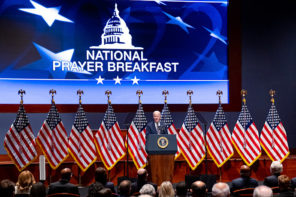Social psychologist Jonathan Haidt, in the latest Democracy:
In 1943, Allied forces achieved a hard-fought victory in the North African campaign, captured Sicily, and began to fight their way up the Italian peninsula. Victories in places such as El-Alamein, Salerno, and Anzio gave America some confidence that the Allies would ultimately prevail in Europe. That confidence allowed the American public to shift more of its attention to the Pacific Theater. Popular magazines such as National Geographic began to publish more maps and articles about the Pacific because Americans suddenly wanted to know a lot more about Saipan and Leyte Gulf.
The same sort of shift is happening now for the left in America’s long-running culture war. From the 1980s until the birth of the Tea Party, most of the action was in the Social Theater, in which the religious right and the secular left waged an existential struggle for the soul of American society. Issues related to sexuality, drugs, religion, family life, and patriotism were particularly vexing, and many people over 40 can recall the names of battlefields such as Mapplethorpe, needle exchange, 2 Live Crew, and the flag-burning amendment. But the left won a smashing victory in the 2012 elections, including the first victories at the ballot box for gay marriage. These triumphs, combined with polling data showing the tolerant attitudes of younger voters, give the left confidence that it will ultimately prevail on most issues in the Social Theater. The power base of the religious right is older, white, rural Protestants, a group that immigration, demography, and urban renewal have consigned to play an ever-shrinking role in American presidential elections.
Haidt argues that the culture wars have moved on to what he calls the “Economic Theater,” where battles over notions of fairness and liberty will define our politics, rather than matters of sexuality and religion.
This sort of complacent conclusion that religious conservatives will be hamstrung from continuing to effect our politics and culture has been commonplace for decades, but has been particularly strident after the 2012 election and the rising acceptance of marriage equality.
Here’s a rare antidote to that complacency: at the Nation, Rick Perlstein has taken a critical look at the broader phenomenon of progressives pronouncing the demographics to be inevitably on their side, and debunked it in light of history.
Humans are complicated. Their interactions with politics are complicated, as are their interactions with religion. And literalist religion provides an intensity of political activism that’s hard to replicate.
Countless examples take place outside the context of presidential politics, which is frequently cited as the sole barometer of these trends. But to see what’s simmering beyond Washington, look at the states. Much of it arises from carefully cultivated sense of besiegement, that “real” Christianity is being undermined by secularists, “nominal Christians,” feminists, and gay people. Some of these legislative efforts will prove successful, some will not. But the peristence of these religiously-motivated legislative efforts is not without impact, even if bills fail to become law.
In Kentucky this week, the legislature overrode a gubernatorial veto of a “religious freedom” bill that will essentially allow anyone to avoid compliance with civil rights laws on religious grounds. The Kentucky Commission on Human Rights protested the bill, and unsuccessfully urged lawmakers to amend it to ensure that citizens protected by the local civil rights laws (such as ordinances that protect LGBT people from discrimination where state and federal laws do not) would continue to be guaranteed those protections. According to the Commission, “On its face, the bill seems to support the rights of religious freedoms guaranteed by the national and state constitutions. However, upon closer examination, the legislation could be used by an individual or entity under the guise of a ‘sincerely held religious belief’ to violate the constitutional and civil rights of other persons or organizations. In other words, it could make discrimination legal if the discrimination perpetrated is claimed to be due to ‘a sincerely held religious belief.'” What are some of the other consequences? “A pharmacist could refuse to provide Plan B drugs to a rape victim. The owner of an apartment building could refuse to rent to an unmarried couple. A woman who gets pregnant out of wedlock could be summarily fired from her job,” writes Rob Boston, Senior Policy Analyst for Americans United for Separation of Church and State. Similar bills are pending in Arkansas, Kansas, Nevada, and Texas, according to Elise Helgesen, AU’s State Legislative Counsel.
After the bill passed, the Congressional Prayer Caucus Foundation put out a statement praising the veto override, and charging, “There is a concerted effort to dismantle our First Amendment rights and redefine freedom. As a result, elected leaders across the nation are realizing the importance of preserving religious freedom and are being proactive through legislative process.” The CPCF, which represents more than 60 members of Congress, claims to be “[a]larmed by the concerted effort to remove God from every vestige of government and to silence the voice of millions” and therefore has placed itself “at the center of a growing network of national, state and local leaders who are protecting our right to be a nation that prays and trusts in God.”
In North Carolina, state House Republicans have filed a bill that would (if it were even conceivably constitutional) trump the Establishment Clause, nullify federal court rulings upholding the Establishment Clause, and allow North Carolina to establish a state religion (a Christian kind, that is). The bill’s sponsors are reacting to a lawsuit by the ACLU, seeking to have explicitly Christian prayers at government meetings declared unconstitutional. According to local coverage, “Overtly Christian prayers at government meetings are not rare in North Carolina. Since the Republican takeover in 2011, the state Senate chaplain has offered an explicitly Christian invocation virtually every day of session, despite the fact that some senators are not Christian.” (And more than a few North Carolina citizens, one would presume.)
On another front, 13 state attorney generals have filed comments with the Department of Health and Human Services, contesting the Obama administration’s proposed amendments made to the contraception benefit rule, and arguing for a broad exemption for anyone — religious institution or not — to be exempt from compliance with the rule on religious grounds. Contraception coverage, though, is not the end of their objections. They close their letter with this foreboding note: “We fear that the HHS mandate is the first of many regulations under the Affordable Care Act that will conflict with legal protections for religious liberty and the right of conscience.”
And don’t forget the raft of legislation to restrict access to abortion. When Haidt cavalierly writes, “If social conservatives separate from libertarians and the Republican Party tries to retake ground lost in the Social Theater, they’ll win only the occasional Pyrrhic victory, alienating women (as with the ‘vaginal probe’ controversy of 2012) and young people,” it’s hard to digest how he can blandly dismiss gains conservatives have made in restricting access to abortion as an “occasional Pyrrhic victory.” Or to minimize wide-ranging and intrusive restrictions as “the ‘vaginal probe’ controversy of 2012.” Somehow, Haidt, writing in a journal which claims its mission is “to build a vibrant and vital progressivism for the twenty-first century that builds on the movement’s proud history, is true to its central values, and is relevant to present times,” thinks that social conservatives are the only ones who have alienated women.
It’s far, far too early to declare that the “Social Theater” has gone dark.




